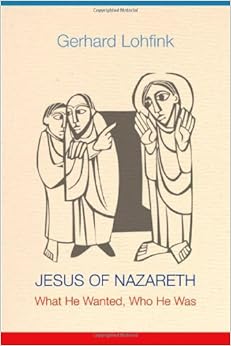"Jesus of Nazareth" by Gerhard Lohfink
Gerhard Lohfink, Jesus of Nazareth: What He Wanted, Who He Was. Liturgical Press, 2012.
"There are innumerable books about Jesus. The reason is obvious: We can never finish with him, and every age must encounter him anew." (xi) Indeed. Here, then, is another such book. Lohfink seeks to give a comprehensive overview of Jesus, examining his actions, message, and life in a combination of historical critical research and theological thinking.
Lohfink does many things well. A friend, the one who requested that I review this book, commented of this book that it made Jesus more real to him than any other book he has read about Jesus. I can see that. Lohfink does an excellent job of bringing what we know about 1st century Palestine to bear on Jesus' life and teachings. Not only that, Lohfink is unquestionably a talented writer (and, I presume, Linda Maloney must also be a talented translator). I often found myself admiring Lohfink's details surrounding Jesus parables, his deep reading of scripture, and his ability to bring these things to life.
At the same time, I found myself constantly disagreeing with Lohfink's conclusions. It seemed that many times, he made the shift from history to theology, or just interpretation, I disagreed with what he had to say. His chapters on miracles, the old testament, and the resurrection stood in this respect.
What really bothered me about this book, however, was not that I disagreed but the places I felt that Lohfink contradicted himself. Some of these were small. For example, he notes that wheat bearing fruit 30, 50, or 100 fold is not unusual, but then goes on to comment that no one could double their money without criminal extortion or some other immoral business practices (commenting on the parables of the sower and the talents, respectively). Others were larger. He opens the book with some excellent comments on historical criticism, noting that "when biblical critics measure Jesus only by their own prior understanding, deciding ahead of time what is 'historically possible' and what is 'historically impossible,' they exceed their own limitations." Unfortunately, Lohfink goes on to make just such decisions as well. Perhaps these were not made 'ahead of time' but they come across as merely affirming Lohfink's own prior understanding, rather than well argued positions backed up by evidence. Other examples include his excellent conclusion that God can be present in "irritatingly unique" ways contrasted with his persistent denial of such instances in his detailed reading of scripture.
What conclusion do I reach? There is some great material here. There are some great points made, even if they are inconsistently applied. But I'm afraid that I can't recommend this book. If you are already fluent in the language and world of historical criticism and, better yet, German theology, then this is a great book. Otherwise, I would send you elsewhere.
Conclusion: Not Recommended. 3 Stars.

Comments